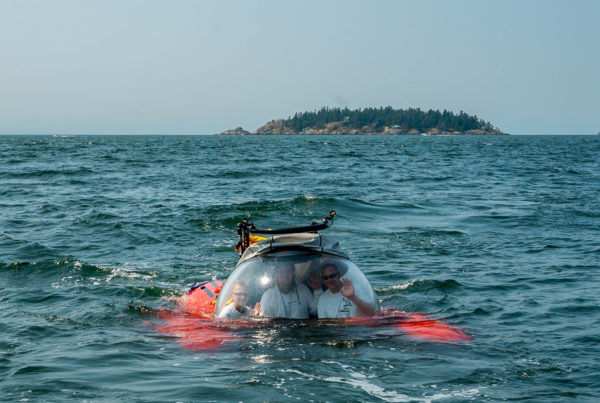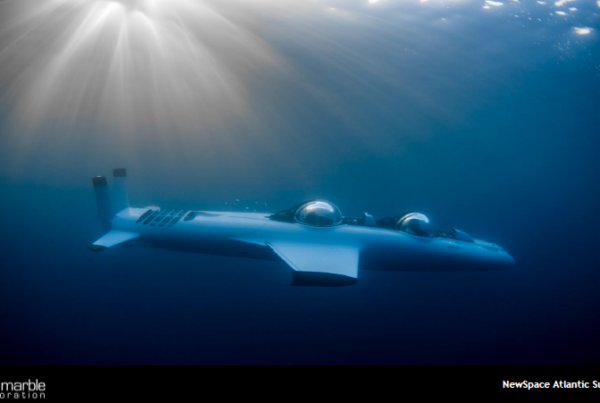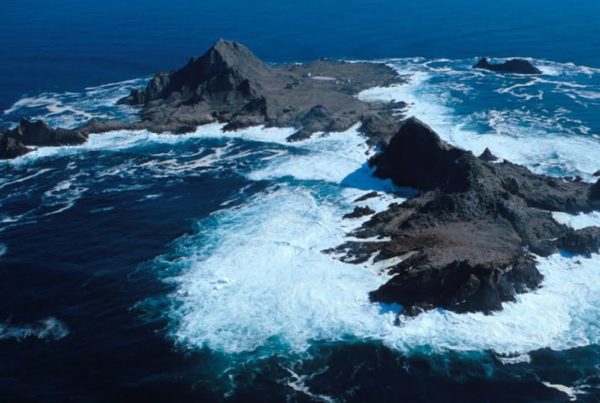My career in the commercial spaceflight industry has long afforded meaningful intersections with the broader exploration community. Organizations like The Explorers Club have helped to connect like-minded explorers, where two camps inevitably arise: space vs. sea.
While the space community extols the enormity of the unexplored universe, it is not uncommon for oceanic lectures to begin with a comment about more people have walked on the Moon than have reached the deepest point in the sea, or how we know far more about the surface of the Moon than the ocean floor. To the those who suggest space is the Final Frontier, submarine designer Graham Hawkes goes as far as to offer his infamous advice: “your rockets are pointed in the wrong goddamn direction!”
Admittedly, I’ve spent more time following Hawking than Hawkes. I’ve spent the past few years working to advance mankind’s footprint in the solar system, puzzling over the particulars of interplanetary life. I’ve worked alongside industry, academia, and government organizations in the pursuit of space exploration, and I’ve spent weeks at a time in isolation at a prototype Martian research facility, studying in situ resource utilization techniques in the hopes of advancing mankind’s ability to live off-Earth. Beyond the inherent desire to explore space myself, my dedication has always been rooted in the simple fact that Earth will one day cease to support life, and that a future without space exploration is no future at all.
Still, I have always rejected the either/or approach to exploration. As an experienced scuba diver, I’ve always been intrigued by the mysteries of Earth’s vast oceans—an anomaly within our known universe. From hostile environments to extreme lifeforms, it seems evident that dividends from the exploration of both sea and space are critical to our advancement and ultimate survival as a species. So earlier this summer when Blue Marble Exploration founder, Guillermo Söhnlein, invited me to participate in an expedition on board OceanGate’s Antipodes submersible, I jumped at the opportunity.
Stockton Rush—OceanGate’s founder, CEO, and sub pilot—utilized advanced sonar to navigate Antipodes in the murky visibility of the ocean floor, allowing our group to explore the remains of the Al-Ind-Esk-A-Sea, a 336-foot fish processing ship that caught fire and burned for several days before sinking off the coast of Seattle in 1982. While I was prepared for the advanced technology that enabled our navigation, I was wholly unprepared for the thrill of submerging hundreds of feet to the ocean floor. Light from the surface dimmed as we descended, and bioluminescent creatures came to life in its absence. Staring out at the alien environment ahead of me, I couldn’t help but wonder if this was the same overwhelming sensation experienced by astronauts upon their first glance through the cupola of the International Space Station.
Intellectually, I appreciated the diversity of our planet. But having the opportunity to explore the ocean floor drove home the magnificent uniqueness of Earth within our universe, and how little we truly know about the “blue marble” we call home. The tenacity of life to flourish at those dark depths, and the potential of what we might find even deeper, reminds me how lucky we are to call this planet home, and how much we still have to explore, both on Earth and beyond.
While I remain an evangelist for space exploration, I have a newfound passion for exploring the sea. In 2016, I’ll be joining Blue Marble Exploration on the world’s first crewed submersible expedition to the bottom of Dean’s Blue Hole in the Bahamas, an exploration event which will be broadcast live around the world.
While I’m fond of proclaiming that this is the first time in four billion years that it’s possible for life to become interplanetary, I now realize that this is also the first time in four billion years that we have the knowledge and know-how to study the unique features of our own planet. Blue Marble Exploration will offer a path to take advantage of this unique window in history, and I feel privileged to join the mission.
| Contributed by Kellie Gerardi Emerging Explorer Blue Marble Exploration New York, NY, USA |









